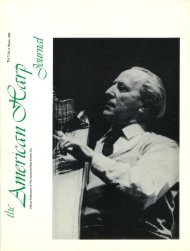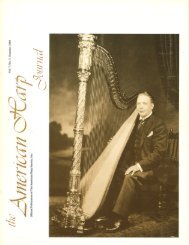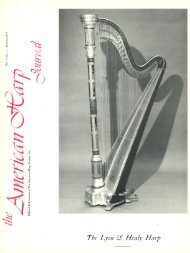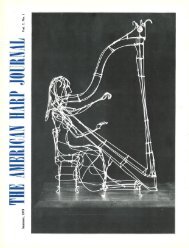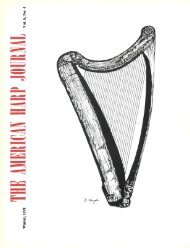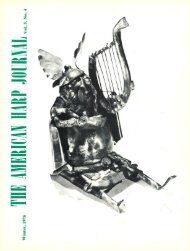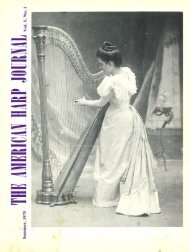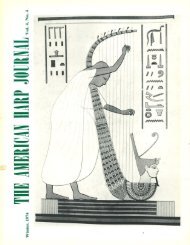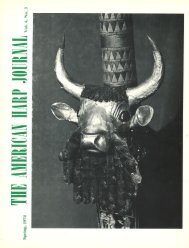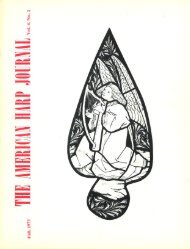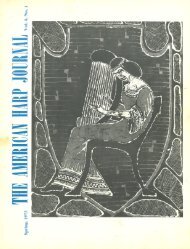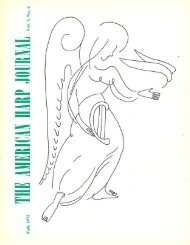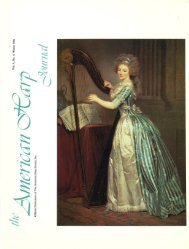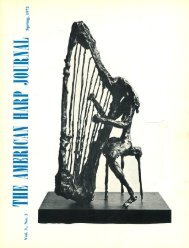You also want an ePaper? Increase the reach of your titles
YUMPU automatically turns print PDFs into web optimized ePapers that Google loves.
the mixture of harmonies, and the lack of clearness.<br />
These faults are rather the qualities of the<br />
harp; string vibrations diminishing freely give<br />
the harp its own unique character. Why should a<br />
harp sound like a piano? It must be treated according<br />
to its own esthetics.<br />
d. Although the organ is regarded as the polyphonic<br />
instrument, it is incapable of differentiating voices<br />
on the same manual, a limitation which applies<br />
also to the harpsichord. Yet the skillful harpist<br />
can give each voice its own "color" by using his<br />
hands alone. The harp has no mechanical devices<br />
which affect its tone.<br />
These so-called limitations are the very factors which<br />
give the harp its divine beauty, and challenge the player<br />
to the utmost. It is interesting to note, along these lines,<br />
that the clavichord (the instrument preferred by Bach<br />
and also by Mozart) had an excessively thin sonority,<br />
but its notes answered to the pressure of the fingers,<br />
and one could therefore obtain great expression and<br />
clearly differentiate the parts of a fugue. I need not<br />
elaborate on the parallels to the harp!<br />
Let me conclude by saying that in music, and more<br />
specifically in the music of ancient times, there is a<br />
constant "transcription" in the sense that the interpreter<br />
transcribes, transmits a message, brings to life the<br />
composer's thought in order that the listener may grasp<br />
this thought with his mind and thereby feel an intellectual<br />
satisfaction, and at the same time an impression<br />
of beauty.<br />
Marcel Grandjany Memorial Concert<br />
Remarks by Peter Mennin, Director, The Juilliard School of Music<br />
Before the second half of the recital begins, I just<br />
wanted to say a word of welcome and greeting to our<br />
special guests and, also, to members of the American<br />
Harp Society, some of whom, I understand, have come<br />
from New Jersey and other cities outside New York to<br />
be with us this evening.<br />
This occasion, as you know, is in honor of Marcel<br />
Grandjany, and it was planned some time ago to take<br />
place as close as possible to the date of his passing last<br />
February 24, when he was in his 83rd year.<br />
Tonight's program is special in several ways. <strong>No</strong>t<br />
only are we remembering Marcel Grandjany, the teacher,<br />
but, in addition, we are hearing the music of Marcel<br />
Grandjany, the composer. All of the Juilliard performers<br />
who are taking part were his students here-and<br />
they are continuing their studies--and I am sure the<br />
music they are playing takes on a special significance<br />
because of that fact.<br />
The harp has been a part of Juilliard teaching and<br />
performing from the School's earliest days. Harp instruction<br />
was included in the very first Prospectus of the<br />
Institute of Musical Art (later to become the Juilliard<br />
School of Music) back in 1905. The first teacher was a<br />
well-known musician and concert performer, Madame<br />
Adelina Rossini.<br />
Marcel Grandjany came to Juilliard in 1938, when<br />
the School was up on Claremont A venue, and for the<br />
next 37 years he was to be the major teacher and influence<br />
for literally hundreds of young performers who<br />
came to study with him, and later joined the country's<br />
major orchestras.<br />
It is not necessary or even practical to recall the<br />
major events and achievements in his career as performer<br />
and teacher. Most of them are well known to<br />
you. But I did want to mention that the anniversary of<br />
his New York debut is two days away, on Saturday;<br />
he performed, to great acclaim, at the famous Aeolian<br />
Hall on February 7, 1924.<br />
22<br />
There were many "firsts" in his career. One of which<br />
he was most proud occurred in 1927 when he gave the<br />
first complete solo recital for harp in his native Paris.<br />
He opened the program with his own "Rhapsodie," and<br />
tonight the program will conclude with it. He performed<br />
the music of Ravel, with the composer conducting.<br />
Every major orchestra invited him to perform as soloist.<br />
His recordings were numerous and popular, particularly<br />
at a time when it was not possible or easy to attend his<br />
public performances. <strong>No</strong> one was more aware than<br />
Grandjany of the limited number of solo and ensemble<br />
works for the harp, and no one did more than he in<br />
enlarging the repertory through his own extensive composing,<br />
transcribing and realizations.<br />
But I imagine most of you this evening have been<br />
thinking of Marcel Grandjany in a rather personal way,<br />
as indeed I have. He was always so delighted when one<br />
of the School's orchestral programs would include a<br />
harp concerto, and he could be counted on to participate<br />
in the auditions for the soloist. But his interest<br />
was not limited to harp by any means. He attended<br />
meetings of the Faculty, came to social gatherings in the<br />
holiday periods, and, with his wife Georgette, who is<br />
with us this evening, was often seen at concerts in Alice<br />
Tully Hall and the Juilliard Theater.<br />
When he founded the American Harp Society in<br />
1962, he told a large committee of interested musicians<br />
that there was a genuine need to foster appreciation of<br />
the harp as a musical instrument by improving the<br />
quality of performance and by encouraging the composition<br />
of music for the harp. But to a single visitor<br />
one afternoon, he summed up all his ideas about performing<br />
and teaching and composing in one sentence:<br />
"Music is a way to give pleasure."<br />
What we hear and feel here tonight demonstrates<br />
that simple truth a thousand fold.<br />
AMERICAN HARP JOURNAL




